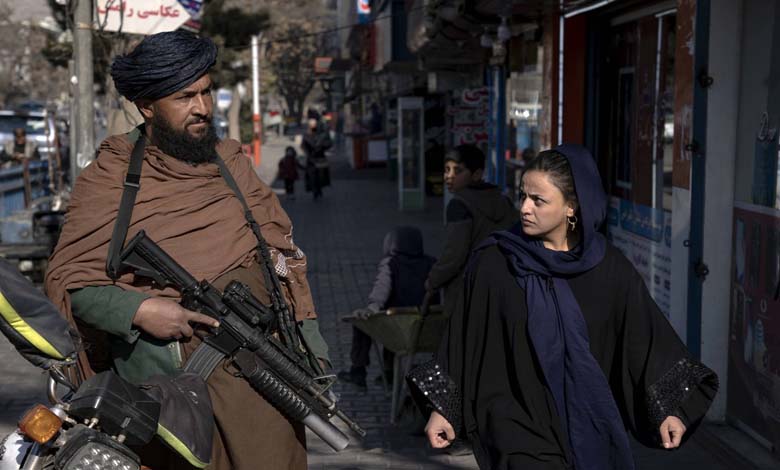The Latest: Banning Voices… The Taliban’s Criminal Record Against Afghan Women

Since taking power in Afghanistan, the Taliban have continued to implement repressive policies that severely affect the rights of women in the country.
-
Human rights report accuses ‘Taliban’ of committing war crimes in Afghanistan
-
Measures in the Autumn of Relations: What the Germany-Taliban Negotiations Have Produced
Violations are increasing significantly, highlighting the rise of brutal practices reflecting the group’s commitment to its hardline ideology.
The latest violation is the adoption by the Taliban of new restrictions aimed at “combating vice and promoting virtue.”
The document, consisting of 35 articles that include harsh laws, considers women’s voices as “potential tools for vice” and states that “women must not sing or read aloud in public, and their voices must not go beyond the walls of their homes.”
-
After 3 Years in Power: Taliban Declares “Women’s Faces and Voices Are a Shame”
-
What Afghanistan has reaped after 3 years of Taliban rule
Women respond to Taliban repression
Afghan women have started responding to these measures, recording videos of themselves singing across the country, defying the Taliban‘s policies to erase women from public spaces.
In the videos, Afghan women are seen singing alone or in small groups, using hashtags like “My Voice is Not Banned” and “No to the Taliban,” while raising their voices against what UN officials have described as “gender-based apartheid.”
-
After 3 Years in Power, Has the Taliban Achieved Diplomatic Success?
-
Russia Invites the Taliban to Participate in an Economic Forum
The Taliban’s criminal record against women
Human rights reports and monitoring of the situation in Afghanistan continue to document the Taliban’s crimes against women, reflecting a significant decline in human rights. The international community must take effective action to pressure the Taliban to stop these violations and ensure the protection of women’s rights in Afghanistan.
-
After Taliban banned women from working for the UN, the European Union links its aid to Afghanistan
-
Afghanistan: Taliban executed dissidents, captives without trial
- Strict restrictions on freedom of movement:
Under Taliban rule, severe restrictions have been imposed on women’s freedom of movement. Women are prohibited from leaving their homes without a male guardian, limiting their ability to work, study, or engage in daily activities. These restrictions have reduced women’s opportunities to contribute to society and the economy, exacerbating their suffering.
-
Qatar behind sophisticated social media coverage of Taliban in recent days
-
Taliban : Ask Airlines to Resume Int’l Flights to Afghanistan
- Ban on education and employment:
One of the most blatant violations is the ban on women’s access to education. Secondary schools and universities have been closed to girls and women, depriving them of opportunities for learning and professional development. Women are also excluded from public and private jobs, eroding their economic and social rights.
-
The United Nations: Afghan women under Taliban rule face the world’s most severe oppression
-
Taliban – Repressive new resolutions target Afghan women
- Imposing repressive laws on clothing and behavior:
The Taliban impose strict laws regarding women’s clothing and behavior. Women are forced to wear the burqa or full-body coverings, and they are not allowed to appear in public without a male guardian. These laws reinforce a culture of control and surveillance over women, diminishing their right to choose how they participate in society.
- Arrests and torture:
Afghanistan has seen a significant increase in cases of arrest and torture of women suspected of violating the Taliban‘s strict laws. These violations include physical and psychological torture, adding further burdens on women already facing political and social restrictions.
-
Afghanistan: Secret schools a way for Afghan women to get their right to education
-
Afghan women in the Taliban era learn ”behind a curtain”
- Restricting freedom of expression:
The Taliban work to restrict women’s freedom of expression, preventing them from writing or voicing their opinions in public. The Taliban view any form of feminist expression as a threat to their control and impose harsh penalties on those considered to be in violation of these laws.
- Lack of personal safety:
These violations increase the risk of sexual and domestic violence, as women lack legal protection and the resources needed to report such crimes. This increases women’s suffering and perpetuates a state of personal insecurity.
-
Taliban Prevent Women’s Education… Crimes that Perpetuate Extremism and Terrorism in Afghanistan
-
Similar violations against women in Iran, Afghanistan, and Yemen – Details
-
After Taliban banned women from working for the UN, the European Union links its aid to Afghanistan












